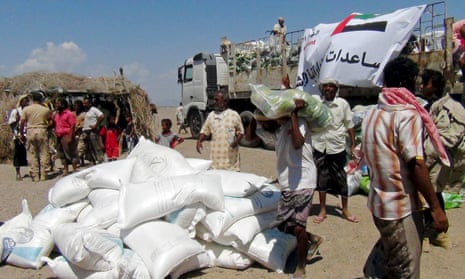In the second week of January 1963, two seemingly unrelated events spoke to Britain’s rapidly changing role in the world, and the Middle East in particular. On the Wednesday, Britain resumed diplomatic relations with Saudi Arabia, broken seven years earlier during the Suez crisis. On the Friday, the British governor of Aden, Sir Charles Hepburn Johnston, took the first step towards formally ceding power to what would become Yemen [see footnote].
Today, Saudi Arabia remains a close ally of Britain, and Yemen is mired in a civil war so ugly the Red Cross has said that after five months of conflict, it looked like Syria does after almost five years.
It is now six months since a coalition of countries, led by Saudi Arabia, took on Iran-backed Houthis who had swept through the country earlier this year. The conflict has claimed nearly 3,000 lives and put 20 million people in need of aid. Half a million of its children are now malnourished. The British government is, to its credit, Europe’s leading humanitarian donor for the crisis, providing £50m for relief including water – essential in a country that was water-scarce even before it descended into violence.
Yet this is at its core a political crisis, and on the political front it represents a massive diplomatic failure. Aside from the Department for International Development, other branches of government seem to have outsourced British foreign policy to Saudi Arabia and other members of the coalition – allowing them, in effect, carte blanche to wage war in such a way that causes unnecessary civilian casualties and makes even more aid necessary.
Human rights abuses and potential war crimes committed by all sides have been documented on the ground in Yemen. Civilians have been directly targeted in violation of international law. While the Houthis appear to divert some supplies from civilians, the Yemeni government in exile and the Saudi-led coalition have implemented a blockade, strangling a country dependent on imports of food and fuel. Without fuel, commercial food supplies cannot get to markets, hospital generators cannot run, water pumps do not function. This contradiction in UK strategy towards Yemen carries on under the cover of western media silence – itself sustained by Saudi Arabia’s rejection of almost all journalists’ applications to enter Yemen.

Faced with this massive humanitarian crisis and privileged to have historic connects to Yemen, we must look at all aspects of British involvement in the round and address this apparent contradiction. To begin with, as an ally of Saudi Arabia we should be ensuring it takes immediate steps to reverse the fuel blockade, reopen Yemen’s Red Sea ports to humanitarian and commercial traffic, and ensure that vital supplies can reach desperate civilians in need throughout the country. The alternative is a famine akin to that seen in Ethiopia 30 years ago. Saudi Arabia does not want that on its doorstep.
As honest friends of both Yemen’s government in exile and of Saudi Arabia, we should make clear that their method of waging this war has the potential to unleash chaos in an already turbulent region. End the attacks on civilians and get back to the negotiating table for peace talks – the British government should be pressing these points at the highest levels possible and, as necessary, in public.
If the fighting goes on, many more children will die from hunger, thousands more refugees will flee for Europe, and a bloody conflict risks becoming entrenched.
There is more that we can do at home to undo this self-negating approach. The UK has for a long time provided vast amounts of military support to Saudi Arabia, including since this crisis began: indeed, the Saudi air force now has twice as many British-built warplanes as our own Royal Air Force. We must take seriously the possibility that British-made arms are being used to kill civilians in Yemen.
The government has been a long-time champion of the UN arms trade treaty, which bans the sale of weapons where there is a risk they will be used in human rights abuses. Crispin Blunt, chair of the foreign affairs select committee, has called for the committee on arms exports controls to look into whether the UK has lived up to its obligations. I hope the other committee chairs who make up the Quadripartite Committeewill back this as a matter of urgency.
In the shadow of the crisis in Syria, millions face famine in Yemen. In a parched country, water bottle factories are being bombed. The UK is far from a neutral bystander in this conflict. In our silence we are implicated. As a great humanitarian nation, with a proud foreign policy tradition, we must stand up for our principles and our interests, even when there are no glowing headlines to be won.
Our relationship to the Middle East may have changed irrevocably that winter week in 1963, but our obligations to the people of Yemen have not disappeared.

